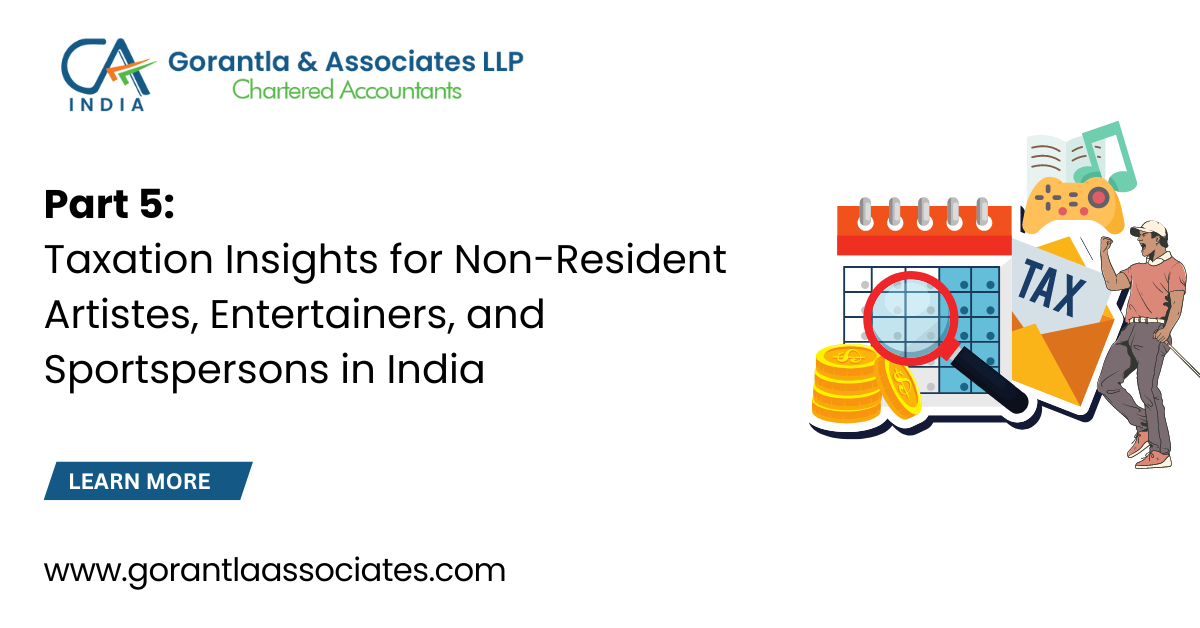
Taxation of Artistes, Entertainers and Sportspersons
- The Domestic Income Tax Law of India contains special provisions to tax non-resident. The Income Tax Act, 1961 (“Act”) is broad enough to tax the non-resident Artistes and Sports persons, whose income is accrued, deemed to be accrued or received in India. The provisions of treaty or the Act whichever is beneficial for such person shall apply.
- Hence, it is in the interest of the country that the domestic income tax act should be wide enough to cover all persons, generating all kinds of incomes from various activities. This is because when the treaty between countries gets amended by mutual consent, the domestic law has to be broad enough to cover the same.
The treaties generally contain article number 17 for Artistes and Sports persons. The article name in all the three model tax conventions is different as below:
- OECD MC: Entertainers and Sports persons
- UN MC: Artistes and Sports persons
- US MC: Entertainers and Sportsmen
- Even though nomenclature used in all MCs is different, the wordings of all the three MCs lead to inclusion of a particular category of persons. The text of the article starts with “Notwithstanding….” This implies that the provisions of this article shall override the articles mentioned. Even if this article had not contained such non obstante clause, still specific provision would have overridden the other general articles.
- The terms “Entertainers”, “Sports persons”, “Artistes” and “Sportsmen” are not defined anywhere in the treaties. The same needs to be understood in general sense and having regard to the examples given in MCs and Treaties. The term “Entertainer” includes persons such as a theatre, motion picture, radio or television artiste or a musician. These examples act as a guiding line to decide persons covered by this article. Earlier, the treaties used the word “Sportsmen”. To make it gender-neutral, almost all treaties have replaced the term with “Sportsperson”.
- Article 17(1) gives taxing rights of income of Artistes and Sports persons to a country of source. It states that:
- There must be a person who is an Entertainer, Sportsperson, Artiste or a Sportsman.
- Such person is resident of a contracting state.
- Such person exercises the performance in the other contracting state.
- Taxation rights have been given to that other state. (Country where performance takes place).
- Let us take an example. The singer Rihanna visits India for a performance.
- Assuming she is tax residence of USA, USA becomes her country of residence and India becomes his country of source. As per the article, India shall have right to tax Rihanna for her performance in India. However, USA may also tax her based on her residency or citizenship. However, USA shall allow her a credit of taxes paid in India as per the relevant article between India-USA tax treaty.
- All the three MCs use source-based taxation. This means taxing rights have direct nexus with the place of performance. Does this mean that the country of residence shall not have any right to tax such Artiste or Sportsperson? The answer is No. The words used in article 17(1) are “may be taxed in that other state”. This implies the country of residence has not given up its right to tax in its entirety. The residence country may tax the same as per its domestic tax law. However, credit of such taxes paid shall be available to such person as per the article on “Methods of Elimination of Double Taxation”. The home country shall either exempt such income or give credit of taxes paid on doubly taxed income in the source country. All the three MCs have similar wordings except USMC, which has a basic exemption of $ 20,000. This implies if the income earned by such person does not exceed $ 20,000 in a year, then the same shall not be subject to tax in the source country.
- Article 17(2) states that when an Artiste or a Sportsperson exercises her personal activities, but the income arising out of this accrues to some other person, then in such case also the source country shall have right to tax that other person. This is an anti-avoidance measure.
- The important and conclusive factor of this article is “performance”. Once in a lifetime performance is also covered here.
- To be termed as an artiste:
- There must be a performance;
- Performance should be in public, i.e. directly before an audience or recorded and later reproduced for an audience;
- Predominant element of the performance must be artistic and entertaining (level of entertainment is irrelevant);
- Performer by himself / herself should be the direct or indirect reason why the audience is listening to or watching the performance.
- Let us take an example where Allu Arjun is an actor as well as director of a film.
- The film requires shooting in Switzerland. The entire team visits Switzerland for shooting including Allu Arjun. However, he does not act as an actor at that place. He only acts as a director. A director cannot be an Artiste or an Entertainer. Hence, income derived by Allu Arjun in Switzerland shall not be covered by this article.
- Further, in case of such dual roles, important factor is whether activities predominantly are of performing nature or performing element is a negligible part. Income is to be attributed accordingly. Also, in this case, the team visiting Switzerland shall include cameramen, choreographers, composers, crew, designers, producers, sound technicians, and so on. These persons are not covered by this article because of the fact that there is an absence of element of “performance”.
- A writer is not considered as a performer and hence outside the purview of this article.
- For example, Writer Chetan Bhagat publishes a novel. The income arising from this shall not be covered here. However, income of Chetan Bhagat from reading his novel in a show shall be covered by this article as it will have an element of performance.
- Few other examples of persons covered can be circus artistes, comedians, DJs, VJs, magicians and persons not covered can be umpires, match referees, interviewers, journalists, painters, photographers, radio personalities, sculptors, speakers at conferences, tour managers, models in fashion shows. There has been an argument that models in fashion show may be considered a form of entertainment for spectators, many of whom may attend as much to see the models as to see the clothes they wear. Where a model appears in a commercial, they may be considered to be acting.
- It is to be noted that existence of Permanent Establishment is not a precondition for taxation under this article. Further, number of stay in source country is not relevant. Also, if an Artiste or a Sportsperson is employed by a Company and such person gets salary in his residence country for various performances in other countries, then such salary income shall also be governed by Article 17 and consequently, such salary income shall be taxed in the country of source where the performance took place.
- The article allows the source state to impose a tax according to its domestic law, without any limitations. There is no guidance in Article 17 regarding the tax base, tax rate and form of collecting tax. Moreover, there are no strict rules on the deduction of expenses. All of these important elements are left to the source country’s domestic tax law.
- It is interesting to note that, when an Artiste or a Sportsperson received a compensation for not being allowed to perform, article 17 does not apply in the absence of “performance”. In such a case, country of residence shall tax him in the absence of PE in source country. Further, if the performance is cancelled by Artiste or Sportsperson, and he received insurance claim for non-performance, still it will be treated in the same way and taxed only in country of residence in the absence of “performance”.
- The scope of incomes covered in this article also includes income from advertising and sponsorship if it is related to performance. E.g. M. S. Dhoni wears Logo during the Match. Also, income from preparation and training is also covered here. Hence, Indian Cricket Team goes to Australia to play a series and fly in 3 weeks in advance to practice on the ground, income earned from such activity is covered under this article. It is interesting to note that the activities of political, religious and charitable nature are also covered here if the element of “Entertainment” is present.
- A practical controversy may arise in a case where a non-resident Artiste or Sportsperson performs in India and earns Income. Under section 115BBA, such persons are taxed at the rate of 20% on Gross Income basis. However, the residence country may tax such person on net basis after allowing expenditure for such performance. The excess tax paid in source country shall not be allowed as credit. This does not solve the problem of double taxation. Let us take the earlier example where Rihanna performs in India. Let us assume she earns gross income of $ 10,00,000. She incurred expenses for such performance to the tune of $ 7,00,000. Her net income is $ 3,00,000. Assuming tax rate in USA @ 30%,
- Her tax liability in her country shall be: $ 3,00,000 X 30% = $ 90,000
- Income tax paid in India U/s 115BBA: $ 10,00,000 X 20% = $ 2,00,000
- Tax payable in USA = Nil. However, excess tax paid in India of $ 1,10,000 shall not be allowed to be carried forward for set off under ordinary credit method. This leads to double taxation to that extent.
- Practically, if Article 17 is strictly applied, it will be a barrier in cultural exchange between countries. Hence, contracting states are free to amend the agreement as per their convenience and the states should amend the treaties in a way to build healthy relations.
- Deduction of expenditure not permissible: No deduction in respect of any expenditure or allowance shall be allowed under any provision of this Act in computing the income referred in the table given above
- Filing of return of income not required: The Assessee is not required to furnish under section 139(1) a return of his income if-
- a) his total income in respect of which he is assessable under this Act during the previous year consisted only of income referred to in (a) or (b) or © above; and
- b) the tax deductible at source has been deducted from such income.
- Example: During the financial year 2022–23, David Warner, a cricketer and Australia citizen participated in India in a Cricket Premier League and won prize money of ` 15 lakhs. He contributed articles on the League in a local newspaper for which he was paid ` 1 lakh. He was also paid ` 5 lakhs by a Soft Drink company for appearance in a T.V. advertisement. Although his expenses in India were met by the sponsors, he had to incur ` 3 lakhs towards his travel costs to India. He was a non- resident for tax purposes in India.
- What would be his tax liability in India for A.Y. 2023–24?
- Is he required to file his return of income?
Interpretation: Under section 115BBA, all the three items of receipts in India viz. prize money of ` 15 lakhs, amount received from newspaper of ` 1 lakh and amount received towards TV advertisement of ` 5 lakhs — are chargeable to tax. No expenditure is allowable as deduction against such receipts. The rate of tax chargeable under section 115BBA is 20%, plus cess @4%. The total tax liability works out to ` 4,36,800 being 20.8% of ` 21 lakhs.
- He is not required to file his return of income –
(a) As his total income during the previous year consists only of income arising under section 115BBA; and
(b) the tax deductible at source have been deducted from such incomes
Visit to know more about NRI Taxation Or www.gorantlaassociates.com
—
Continue Read:
NRI Taxation Simplified:Understanding Residential Status and Taxes-Part 1
Understanding NRI Accounts and Taxation: Types and Implications — Part 2
Navigating NRI Capital Gains and Taxation: A Comprehensive Guide for Post-2018 Rules — Part — 3
Repatriating Property Sale Proceeds for NRIs: Process and Tax Implications — Part -4
Taxation Insights for Non-Resident Artistes, Entertainers, and Sportspersons in India — Part 5
NRI Tax Deductions and Special Provisions Under Chapter VI of the IT Act — Part 6
NRI and Foreign Citizen Taxation on Cross-Border Transactions — Part 7
Simplifying Taxation for NRIs with Blanket Deductions — Part 8
Disclaimer:
This Article/Blog has been contributed by Butchibabu Gorantla, B.Com, FCA, FCS, Chartered Accountant. This article/blog is posted with due authorization from the author for the academic purposes. The views and opinions expressed herein are those of the author and don’t constitute a legal advice to any user.
Related Posts
A Comprehensive Overview of the Finance Bill 2024
The Finance Bill 2024, introduced in the Lok Sabha, seeks to implement the financial proposals…
The Provisions of the Finance Bill, 2024: A Comprehensive Overview
The Finance Bill, 2024, introduces several amendments to the Income-tax Act, 1961, and other related…
Understanding the Income Tax Slab Rates for FY 2023-24, AY 2024-25: New vs. Old Tax Regimes
The income tax slab rate is the percentage of tax you pay on your income,…
Which ITR Form is Right for You? Find Out Now!
Filing your Income Tax Return (ITR) in India is an essential responsibility. However, with various…






